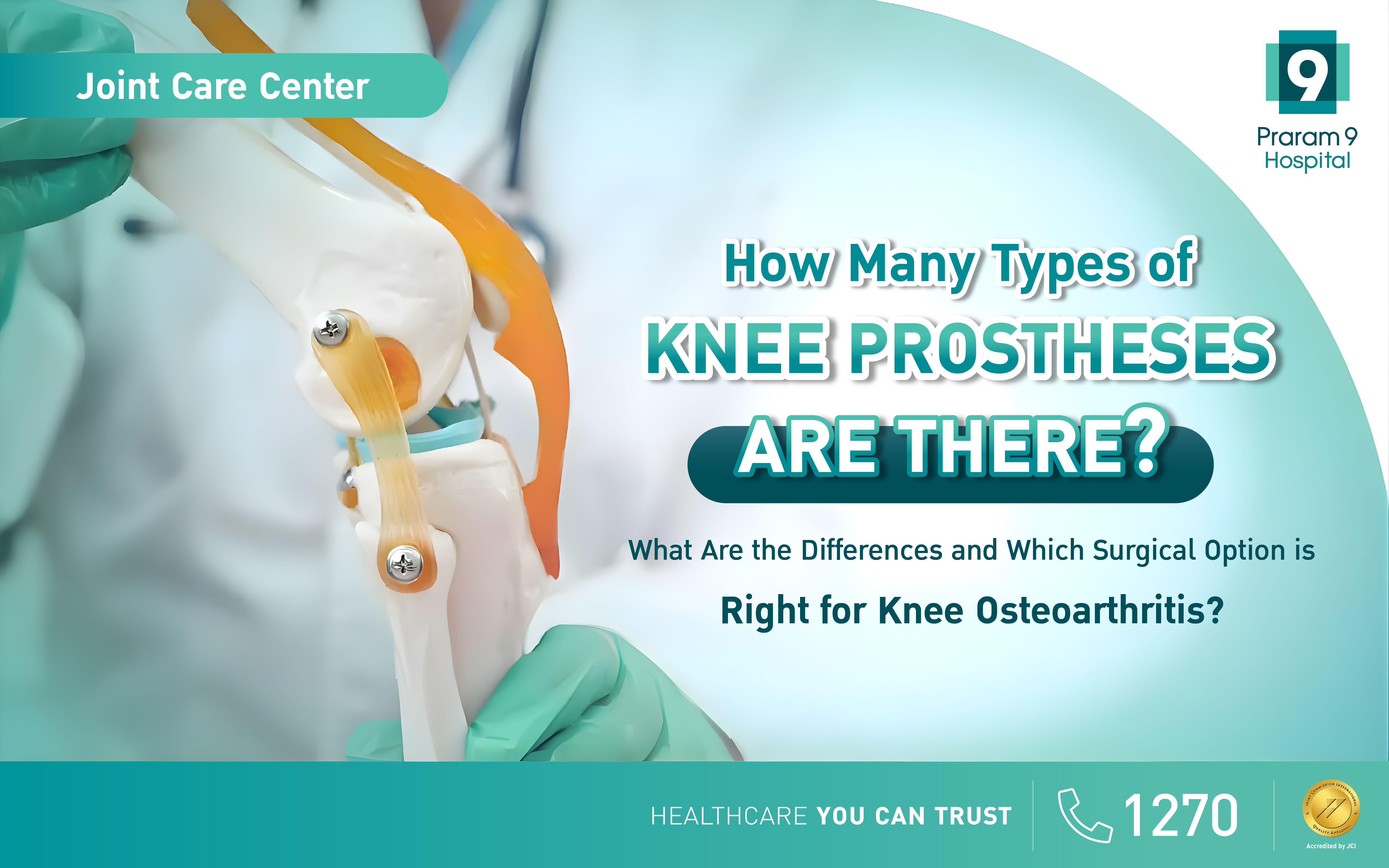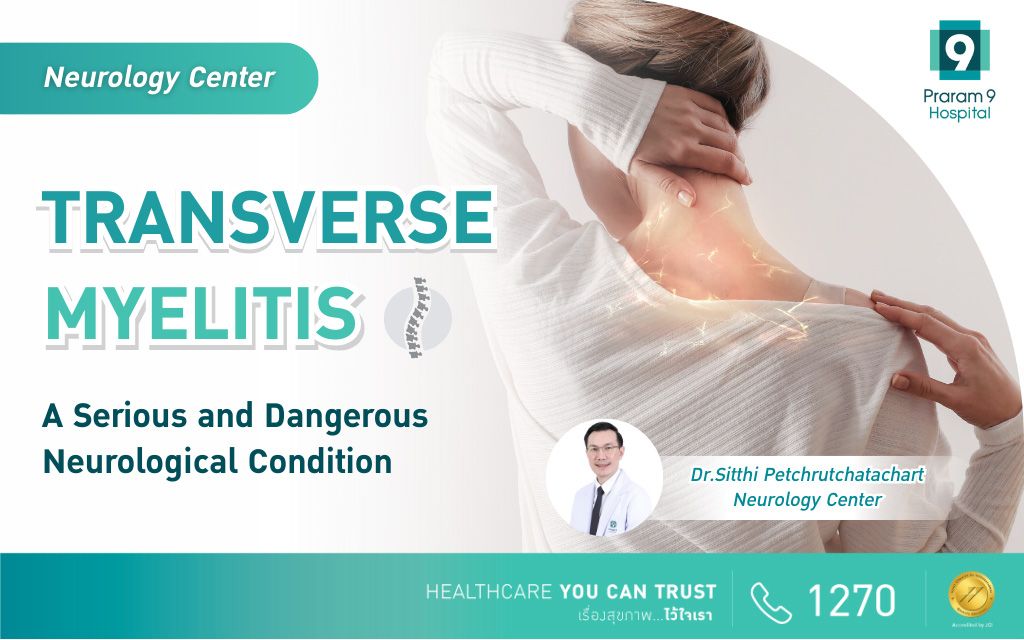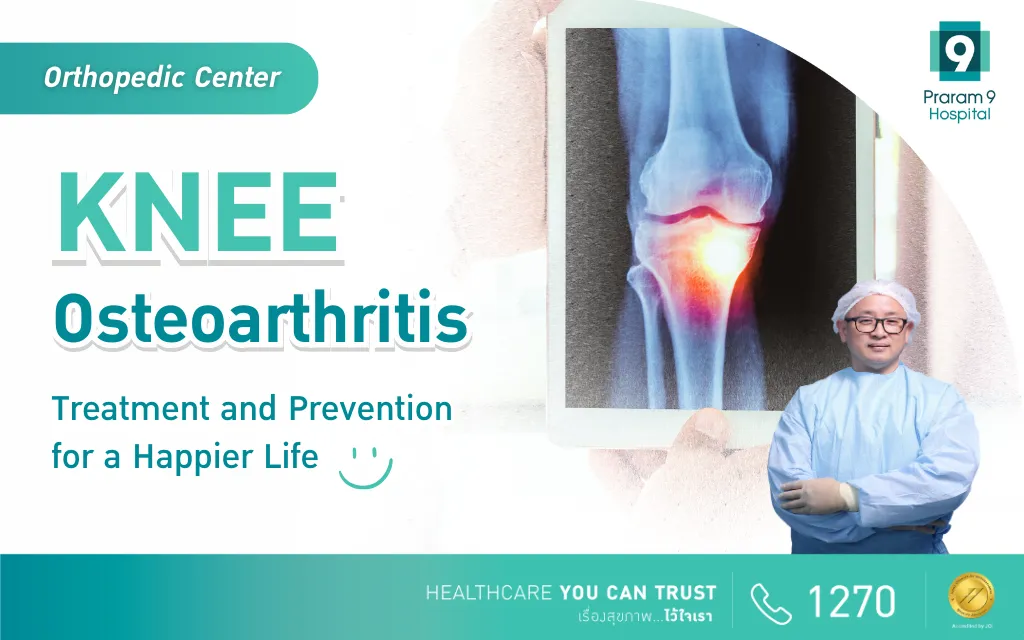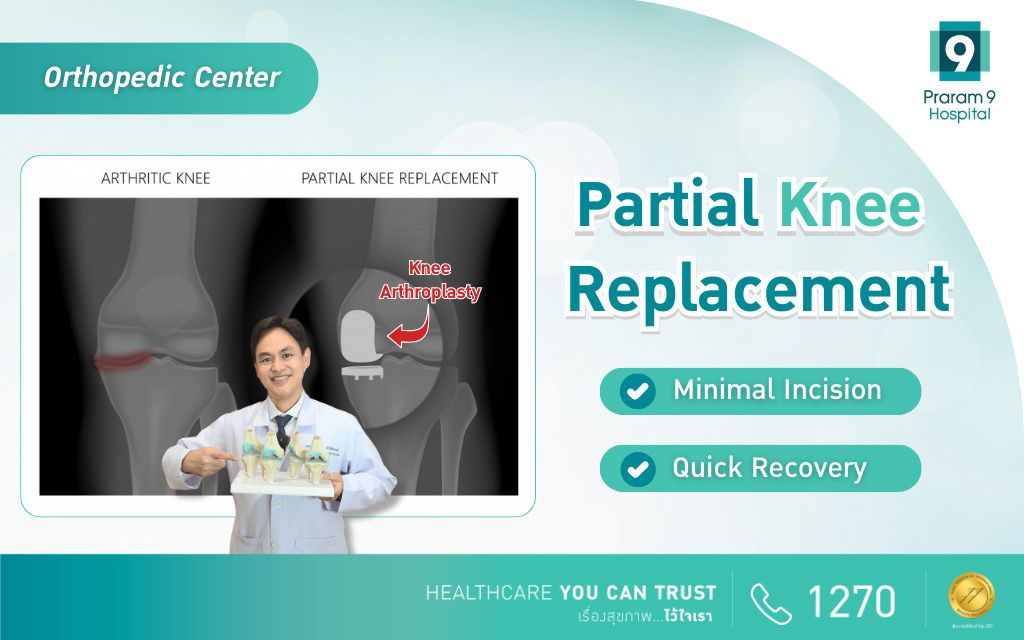Health Articles
Knowledge
“New Kidney, New Life” The Kidney Transplant Surgery Experience at Praram 9 Hospital
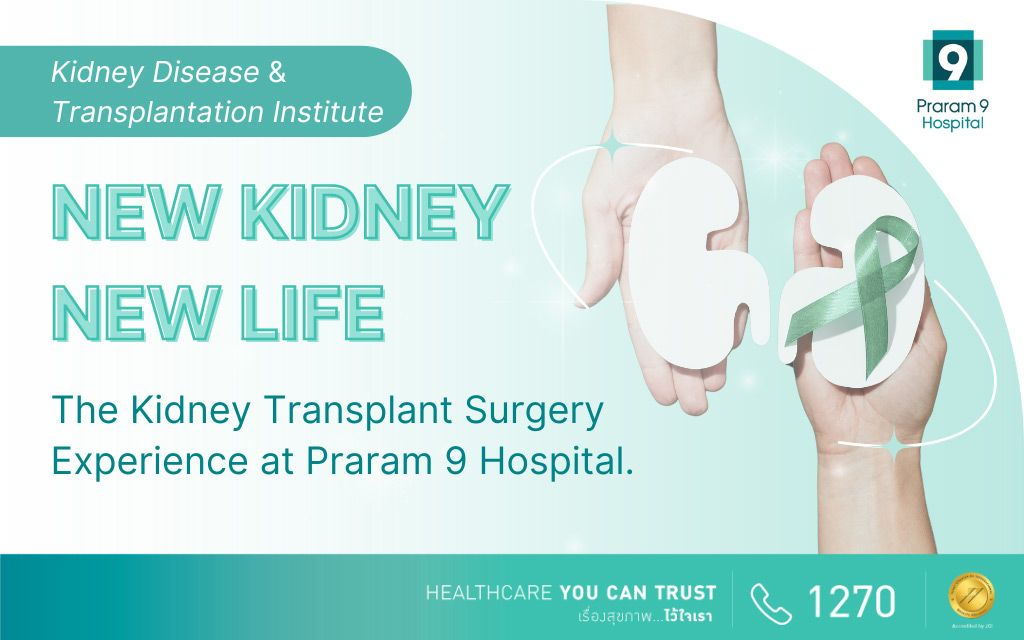
End-stage renal disease (ESRD) significantly impacts the quality of life for patients due to the necessity of ongoing hemodialysis treatment. Hemodialysis serves as a vital substitute for the impaired kidney function, facilitating the removal of waste products from the body. However, this treatment program demands regular sessions several days each week, thereby imposing profound disruptions on the patient’s daily life.
Currently, treating chronic kidney failure through kidney transplant surgery is the best option for patients with chronic kidney failure. This is because after surgery the patient can return to living a life close to normal and having a better quality of life.
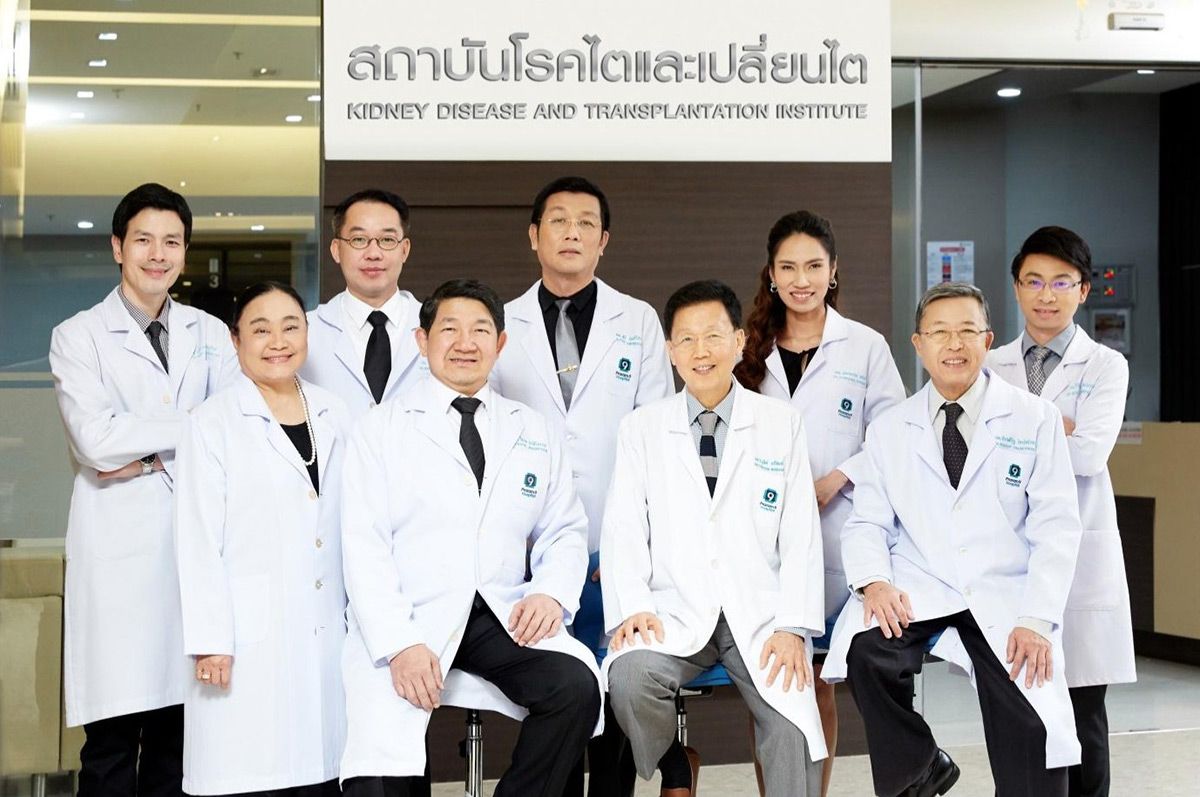
Over the span of three years since its inauguration in June 1992 until February 28, 2023, Praram 9 Hospital has successfully completed 1,180 kidney transplant procedures, marking a significant achievement in medical practice. This commendable success underscores the institute’s commitment and compassionate to excellence in healthcare. The outcomes of these kidney transplant surgeries have been exceptionally positive, with patients experiencing a notable improvement in their quality of life. Following the procedure, recipients are able to resume their daily activities with a renewed sense of normalcy, enjoying an enhanced standard of living.
The following statistics are of interest
- The youngest patient to receive a kidney transplant was 11 years old.
- The oldest patient to receive a kidney transplant was 84 years old.
- 349 patients over the age of 60 received kidney transplants.
- 98 patients underwent repeated kidney transplant surgeries due to previous failed kidney transplants.
- 5 pregnant patients received kidney transplants, and 7 babies were born to mothers who had received kidney transplants.
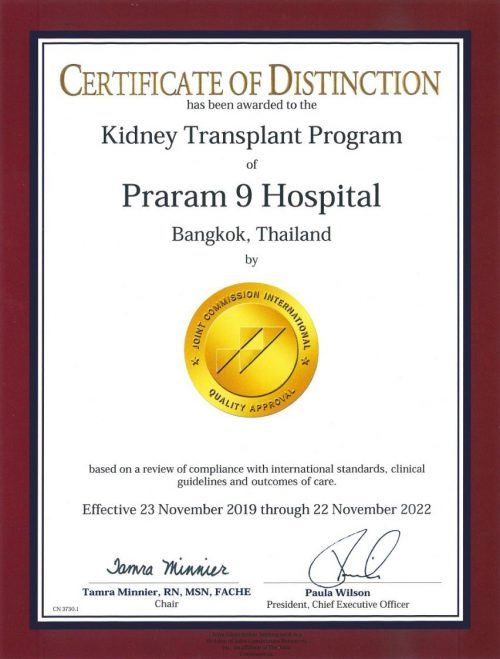
In 2016, Praram 9 Insitute of Kidney Diseases and Transplantation achieved a significant milestone in healthcare excellence. The institute was bestowed with a prestigious certificate of honor by the Joint Commission International (JCI), USA, for its exceptional standards in kidney transplantation. This recognition underscores the institute’s unwavering commitment to upholding world-class medical standards and providing exceptional care to patients undergoing kidney transplant procedures. Such recognitions reaffirm the institute’s dedication to excellence and serve as a testament to its continuous pursuit of medical innovation and patient-centric care.
In this article, we are privileged to feature the firsthand testimonial of the recipients of a kidney transplants from Praram 9 Hospital. Their willingness to share their journey and insights into the transplant surgery process offers valuable perspective and inspiration to others facing similar medical circumstances. We are honored to provide a platform for their story, illuminating the transformative impact of modern medical advancements in restoring health and vitality.
Sharing Experiences of our Kidney Transplant Patients

The kidney transplant surgery performed at Praram 9 Insitute of Kidney Diseases and Transplantation was considered highly successful, enabling the patient to resume a life close to normalcy and experience a significantly improved quality of life. As a result of these positive outcomes, the patient graciously accepted the opportunity to share their firsthand experience of the kidney transplant surgery with us.
Ms. Khin Lay Win… From Myanmar
“During the period of kidney disease, I experienced swollen feet, which caused my body to feel tight and stiff, making movement difficult. Additionally, I began experiencing symptoms of muscle tightness, including cramps in my calves and muscle pain.Following the surgery, I immediately felt an improvement in my condition. Everything felt lighter and better. I realized there was no need to fear surgery. Choosing the right hospital and doctor proved to be crucial, as I am still recovering well.”
Ms. Yumi… From Japan
“Thai individuals residing in Japan initially considered undergoing kidney transplant surgery there due to potential reimbursement of treatment costs. However, upon consultation with a doctor, it was recommended that they seek treatment at Praram 9 Hospital in Thailand. Renowned for its expertise and consistent research advancements, Praram 9 Hospital offers a trusted option for kidney transplant surgery. Additionally, having supportive siblings in Thailand to provide care and encouragement further solidifies the decision to pursue treatment closer to home.”
From Qatar to Thailand
“Originating from Qatar and initially planning to undergo kidney transplant surgery in America, the uncertainty surrounding the procedure persisted even after a year of waiting, leaving the medical team unable to provide clear progress updates. In light of this, the Qatar Embassy in Thailand recommended seeking treatment at Praram 9 Hospital, renowned for its excellence in medical care and expertise in kidney transplant procedures.”
Mr. Tony...from Korea
“An American soldier stationed in Korea, whose Thai wife initially planned to travel to America for kidney transplant surgery, ultimately opted for treatment at Praram 9 Hospital. The decision was made due to the hospital’s renowned reputation for providing treatment results that meet international standards.”
Mr. Suthon... A Thai but originate from India
“Mr. Suthon, a Thai but originate from India, reconsidered his plans to seek a kidney transplant abroad due to concerns regarding potential legal complications and health risks associated with the procedure. Fortunately, upon recommendation from an acquaintance, he discovered a reputable doctor affiliated with Praram 9 Hospital.”
Mr. Suthipong…from Thailand
“Suffering with kidney failure while his wife was three months pregnant with their first child, he experienced profound despair and heartbreak. However, following successful kidney transplant surgery, his body regained its vitality, allowing him to embrace life once more. Today, with two children by their side, the couple finds immense joy and fulfillment, grateful for the gift of renewed health and happiness.”
Mr. Rungthip (Ae) …from Thailand
“Enduring a life marked by both physical and mental anguish since the age of 6 due to kidney disease, this individual’s journey has been one of resilience and perseverance. Despite a prior unsuccessful kidney transplant surgery, they remain steadfast, enduring 21 years of dialysis treatment until the opportunity for a second kidney transplant arose at Praram 9 Hospital.”
Ms. Aew Anchana…from Thailand
“It felt as though heaven itself had descended to offer comfort. Upon my return home, I saw a vehicle from Praram 9 Hospital stationed outside ready to transport me for my kidney transplant surgery.”
Ms. Ratchani…from Thailand
When her husband, an Army pilot, selflessly donated his kidney to his beloved wife, it didn’t only save her life but also allowed her to continue pursuing her own dreams. With the gift of renewed health, she can now look forward to continuing her journey alongside her husband until his well-deserved retirement.
Mr. Preecha…from Thailand
Despite facing congenital health challenges and navigating through various medical procedures including heart surgery, balloon surgery, brain surgery, and undergoing kidney transplant twice, Mr. Preecha’s resilience shines through. Born as a miracle, Mr. Preecha remains steadfast in his commitment to embracing a new life, ready to embark on a journey filled with hope and determination.
Ms. Phethai…from Thailand
After undergoing two full years of cancer treatment, she underwent a successful kidney transplant. Now, it has been 11 years since the transplant surgery, during which time her kidneys have been functioning optimally, and the cancer has been cured.
Ms. Niramon…from Thailand
“Following my father’s selfless act of kidney donation at the age of 26, my life took a remarkable turn. I embraced the joys of marriage, parenthood, and family life. Twenty-five years have since elapsed. Today, as my daughter graduates from university and my father celebrates his 75th birthday, I am filled with gratitude to witness their milestones. Remarkably, my father remains in robust health, a testament to the enduring impact of his generous gift.”
Ms. Saowanee…from Thailand
“At the age of 62, I underwent a kidney transplant, graciously donated by my child. Now, at 85 years old, I am grateful to enjoy vigorous health, a testament to the care I have diligently provided for myself.”
Mr. Chatthip…from Thailand
“At the age of 80, despite contending with congenital diseases such as diabetes, high blood pressure, obesity, and heart disease, Mr.Chatthip made the courageous decision to undergo a kidney transplant. After undergoing thorough physical and mental health assessments by the medical team at Praram 9 Hospital, Mr. Chatthip were deemed fit for the surgery, demonstrating remarkable resilience and determination”
Mr. Thongchai…from Thailand
“Inadequate healthcare has resulted in the deterioration of the replaced kidney twice before. As I undergo surgery for the third time, it feels like embarking on a third life—a golden opportunity to revitalize my health and well-being to the fullest extent possible.”
Information for Kidney Transplant Surgery
Kidney transplant surgery is a significant medical procedure, necessitating thorough preparation by both the patient and their relatives. This preparation encompasses various aspects, including readiness for the surgery itself, meticulous care during the surgical process, and diligent self-care post-operation. Additionally, attention must be given to lifestyle adjustments, such as dietary considerations and nutrition, as they play a pivotal role in the patient’s recovery journey. By prioritizing self-care and adhering to recommended practices, patients can facilitate a smoother transition back to normalcy and achieve an improved quality of life post-transplant.
Summary
Although a kidney transplant is undoubtedly a complex procedure, when performed by a dedicated and skilled team of doctors and personnel specializing in various fields, the success is significantly strengthened. Through comprehensive care provided both before and after the transplant, patients benefit from enhanced support and expertise, maximizing the potential for positive outcomes. Following a successful kidney transplant, patients can anticipate a return to a fulfilling and normal life, free from the constraints of renal disease.

